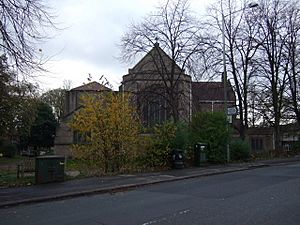St Michael and All Angels Church, Ashton-on-Ribble facts for kids
Quick facts for kids St Michael and All Angels with St Mark Preston |
|
|---|---|

Aspect from Tulketh Road
|
|
| Lua error in Module:Location_map at line 420: attempt to index field 'wikibase' (a nil value). | |
| OS grid reference | SD519301 |
| Location | Egerton Road, Ashton-on-Ribble, Preston, Lancashire |
| Country | England |
| Denomination | Anglican |
| Website | St Michael and All Angels, Ashton on Ribble |
| History | |
| Status | Parish church |
| Consecrated | 2 July 1908 |
| Architecture | |
| Functional status | Active |
| Heritage designation | Grade II* |
| Architect(s) | Austin and Paley |
| Architectural type | Church |
| Style | Gothic Revival |
| Groundbreaking | 1906 |
| Completed | 1915 |
| Specifications | |
| Materials | Sandstone, red tiled roofs |
| Administration | |
| Deanery | Preston |
| Archdeaconry | Lancaster |
| Diocese | Blackburn |
| Province | York |
St Michael and All Angels with St Marks Church is a special church located in Preston, England. It's an active Anglican church, which means it's part of the Church of England. This church is a parish church, serving the local community. It works together with St Mark's Church and St Andrew's Church in the area. The church is also a Grade II* listed building. This means it's a very important historical building.
Contents
History of St Michael's Church
St Michael's Church was first built because more people were moving into the area. It started as a smaller church connected to St Andrew's Church. The first stone for the church was placed in September 1906.
The church was officially opened on 2 July 1908 by the Bishop of Manchester. At that time, only part of the church was finished. This included the main area near the altar, the organ, and part of the main hall.
The architects who designed the church were Austin and Paley from Lancaster. The rest of the main hall was finished in July 1915. However, the top part of the tower that was planned was never built.
In December 1929, St Michael's became its own separate church parish. Later, in 1993, it joined with St Mark's Church. In April 2006, it also joined with St Andrew's Church. Now, these churches work together as the West Preston Team.
Church Design and Features
Outside the Church
The church is built from a type of stone called sandstone. It has red tiled roofs. The church has a main hall (nave) and a special area near the altar (chancel) that are connected. It also has a raised section with windows (clerestory) and side aisles.
On the south side, there is a porch, the unfinished tower, and a small chapel. On the north side, you'll find a transept (a part that sticks out), a vestry (a room for clergy), and a parish hall. The church's style is called Perpendicular Gothic, which is a type of Gothic Revival design.
The clerestory has windows with two sections each. There are ten on the north side and seven on the south. The aisle windows are square-shaped with stone dividers (mullions). Most of these have three sections. At the west end of the church, there is a large window with five sections.
Above the door in the south porch, there is a carving of Saint Michael. The tower is tall and has strong supports (buttresses) at its corners. It has a door on the south side with a five-section window above it. The top of the tower has a pyramid-shaped roof.
The east end of the church has a short, angled area (sanctuary) with buttresses. The east window has five sections. The chapel has two windows on the south side and a four-section window on the east side. It also has a parapet with a decorative top.
Inside the Church
Inside, the church has rows of arches (arcades) supported by eight-sided pillars. The beautiful stained glass in the east window was made in 1968 by Harry Stammers. Other windows from the early 20th century were likely made by Shrigley and Hunt.
The church has a large organ with three keyboards (manuals). It was built in 1934 by Henry Ainscough. The organ was later checked and repaired by the same maker in 1953.
More Information
- Grade II* listed buildings in Lancashire
- Listed buildings in Preston, Lancashire
- List of ecclesiastical works by Austin and Paley (1895–1916)
Images for kids
 | William M. Jackson |
 | Juan E. Gilbert |
 | Neil deGrasse Tyson |


